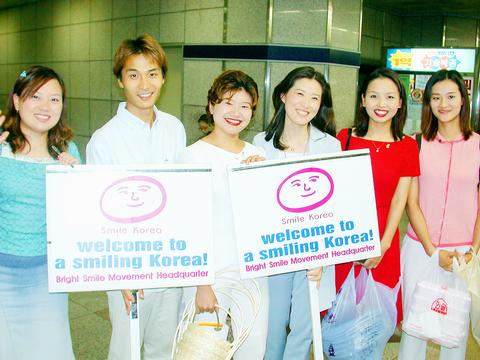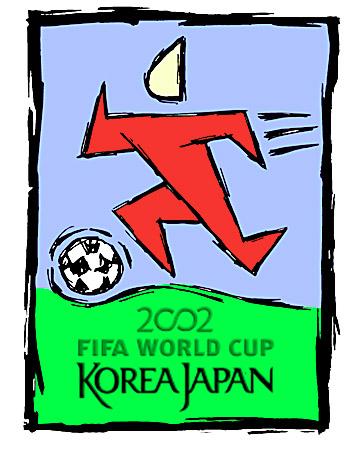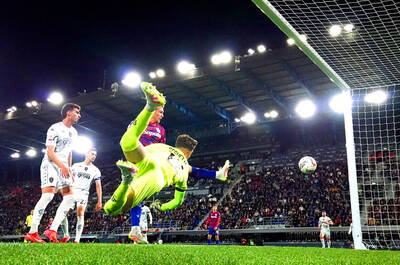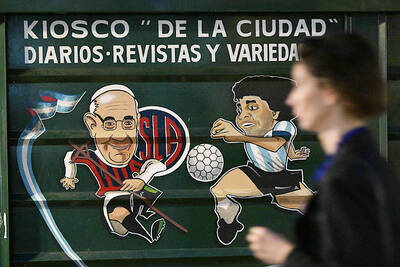World Cup soccer is teaching the South Koreans to smile, a member of the country's smiling movement claimed yesterday in Seoul.
Leading a posse of fellow "smiley" adherents on the subway to Incheon Munhak Stadium the day before for the game between France and Denmark, she told the Taipei Times the World Cup was a watershed in South Korea's 5,000-year history.

PHOTO: JULES QUARTLY, TAIPEI TIMES
Lee Woo-jung, assistant development team manager of the Bright Smile Movement, said she was "very serious" about this issue, after President Kim Dae-jung called on his country's citizens to warmly welcome visitors.

According to Lee, South Koreans have not been in the habit of making the facial statement denoting friendliness or something funny for over 500 years.
"In the Chosun Dynasty it was not fashionable to smile as this could have meant that you were not serious about something, or it could mean that you were laughing at a person in authority," she said.
"Korea has not smiled since then. Our smiling faces disappeared and now we have to learn how to do it all over again."
The group even has a teacher. Jung Pack-so is a "master of 10,000 expressions" according to her housemate and fellow Bright Smile Movement member Lee Jeong-hee.
"She teaches us how to smile. We practice our smiles every day in the morning [in front of the mirror]. We must exercise our smiles every day if we are to become better at it," she said.
Smile teacher Jung demonstrated how she taught her students.
She pointed to her head and said, "First, our minds must be bright." Then she pulled her cheeks. "Secondly, we must make muscle movements in our face." Then she touched her chest. "Now we feel happy in our hearts."
Lee Woo-jung said the World Cup was a historic opportunity to show foreigners that "we are a happy people. We very much want to share our international culture. It's one world and this is what a smile means. It will be a big change in our long history."
The Bright Smile Movement is affiliated to the Global Association of Culture and Peace, which is said to have 40 branches around the world, including in Taiwan.
While it cannot be said to be shadowy, the movement has some similarities with cults.
It was formed by Joshua Jung, who was born in, and developed a retreat at, a secluded village called Wolmyungdong in Geumsan County, a famous ginseng-growing area in central South Korea.
It is said to have the biggest natural rock landscaping park in the country and a "Fountain of Miracles" which some say can heal incurable diseases.
According to the Global Association of Culture and Peace, Wolmyungdong is a "masterpiece embodied with divine design although made by human hands."
The members of the group said they weren't all Christians, but when I asked each one of them, they all said they were.
Other members of the organization, dressed in traditional clothes, greeted World Cup fans outside Incheon Munhak Stadium.
The young women I met on the subway later dressed up in a uniform of short pants and tight tops on their missions to "spread a smile," while the young men in the group were said to be good singers and attracted female converts.
I did not find out what they were converted to; for that I would have to have taken a three-hour drive out into the country. And I'd had enough of smiling and wanted to watch some soccer.

Bologna on Thursday advanced past Empoli to reach their first Coppa Italia final in more than half a century. Thijs Dallinga’s 87th-minute header earned Bologna a 2-1 win and his side advanced 5-1 on aggregate. Giovanni Fabbian opened the scoring for Bologna with a header seven minutes in. Then Viktor Kovalenko equalized for Empoli in the 30th minute by turning in a rebound to finish off a counterattack. Bologna won the first leg 3-0. In the May 14 final in Rome, Bologna are to face AC Milan, who eliminated city rivals Inter 4-1 on aggregate following a 3-0 win on Wednesday. Bologna last reached the

If the Wild finally break through and win their first playoff series in a decade, Minnesota’s top line likely will be the reason. They were all over the Golden Knights through the first two games of their NHL Western Conference quarter-finals series, which was 1-1 going back to Minnesota for Game 3 today. The Wild tied the series with a 5-2 win on Tuesday. Matt Boldy had three goals and an assist in the first two games, while Kirill Kaprizov produced two goals and three assists. Joel Eriksson Ek, who centers the line, has yet to get on the scoresheet. “I think the biggest

From a commemorative jersey to a stadium in his name, Argentine soccer organizers are planning a slew of tributes to their late “Captain” Pope Francis, eulogized as the ultimate team player. Tributes to the Argentine pontiff, a lifelong lover of the game, who died on Monday at the age of 88, have been peppered with soccer metaphors in his homeland. “Francisco. What a player,” the Argentine Football Federation (AFA) said, describing the first pope from Latin America and the southern hemisphere as a generational talent who “never hogged the ball” and who showed the world “the importance of having an Argentine captain,

Noelvi Marte on Sunday had seven RBIs and hit his first career grand slam with a drive off infielder Jorge Mateo, while Austin Wynn had a career-high six RBIs as the Cincinnati Reds scored their most runs in 26 years in a 24-2 rout of the Baltimore Orioles. Marte finished with five hits, including his eighth-inning homer off Mateo. Wynn hit a three-run homer in the ninth off catcher Gary Sanchez. Cincinnati scored its most runs since a 24-12 win against the Colorado Rockies on May 19, 1999, and finished with 25 hits. Baltimore allowed its most runs since a 30-3 loss to